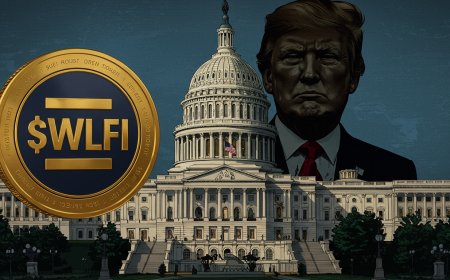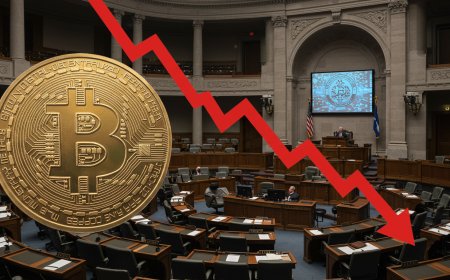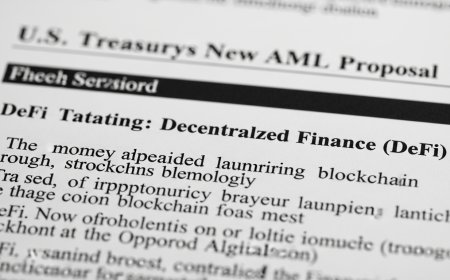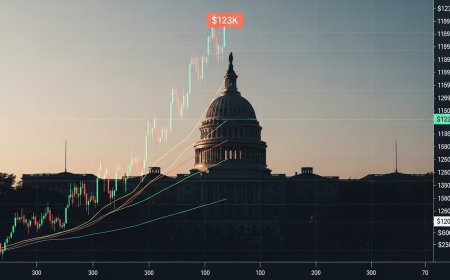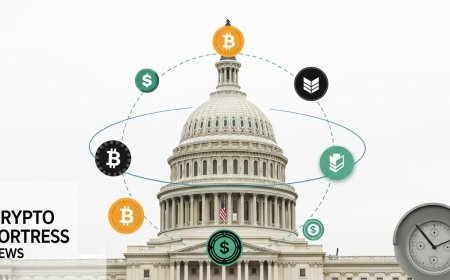U.S. Congress Launches “Crypto Week” Starting July 14—Here’s What to
Crypto Week kicks off July 14 in Congress—previewing key bills and hearings on digital assets.
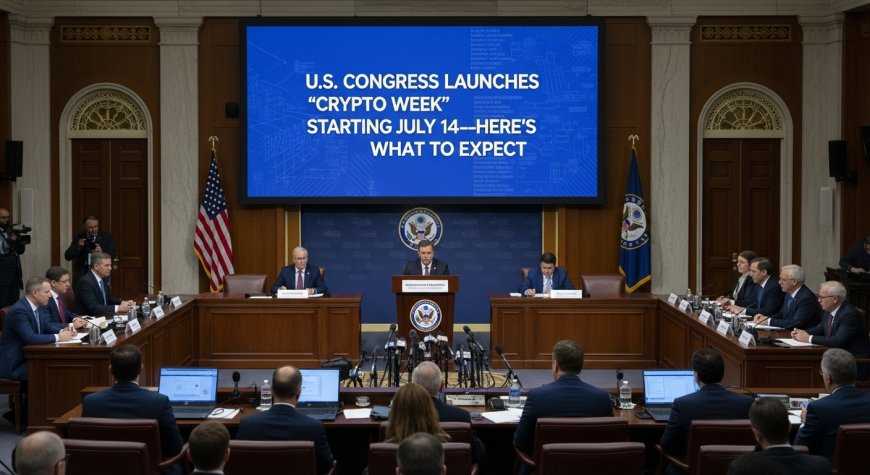
US Congress Launches Historic "Crypto Week" July 14: Major Digital Asset Bills Set for Vote
Executive Summary
The U.S. House of Representatives has officially designated the week of July 14, 2025, as "Crypto Week," marking a pivotal moment in American cryptocurrency legislation. House Committee on Financial Services Chairman French Hill, House Committee on Agriculture Chairman GT Thompson, and House Leadership announced this focused legislative initiative to advance three major digital asset bills that could reshape the regulatory landscape for cryptocurrencies in the United States.
What Is "Crypto Week"?
The House of Representatives looks forward to considering the CLARITY Act, the Anti-CBDC Surveillance State Act, and the Senate's GENIUS Act as part of Congress' efforts to make America the crypto capital of the world. This concentrated legislative effort represents the most significant congressional action on cryptocurrency regulation since the industry's emergence.
Purpose and Goals
The primary objectives of Crypto Week include:
Regulatory Clarity: Republican lawmakers say the legislation will create a clear regulatory framework for digital assets, safeguard financial privacy, and bolster the cryptocurrency ecosystem in the United States.
Comprehensive Framework: Together, these bills seek to overhaul the U.S. digital asset regulatory framework, address stablecoin issuance, and prevent the introduction of a government-backed central bank digital currency (CBDC).
Market Structure: The initiative aims to establish clear guidelines for cryptocurrency operations, trading, and custody within the American financial system.
Three Major Bills Under Consideration
1. The CLARITY Act (Digital Asset Market Clarity Act)
The CLARITY Act focuses on establishing a comprehensive regulatory framework for digital assets and cryptocurrency market operations. This legislation aims to:
- Define clear regulatory boundaries between different types of digital assets
- Establish guidelines for cryptocurrency exchanges and trading platforms
- Create compliance standards for digital asset businesses
- Provide legal certainty for cryptocurrency innovation and development
2. The Anti-CBDC Surveillance State Act
The Anti-CBDC Surveillance State Act seeks to block the Federal Reserve from issuing a central bank digital currency (CBDC). Advocates of the bill argue that a government-issued digital dollar could enable intrusive financial surveillance, compromising citizens' privacy and autonomy over their financial transactions.
Key provisions include:
- This bill is simple: It halts the efforts of this Administrative State under President Biden from issuing a financial surveillance tool that – if not done correctly - will fundamentally alter the lives of every American
- Protection of financial privacy rights
- Prevention of government-issued digital currency implementation
- Safeguarding against potential surveillance overreach
3. The GENIUS Act (Stablecoin Regulation)
The GENIUS Act, passed earlier by the Senate, requires all stablecoins to be fully backed by U.S. dollars or similarly liquid reserves. It mandates annual audits for issuers with a market cap above $50 billion and sets clear guidelines for foreign issuers.
Essential elements include:
- Full backing requirements for stablecoin issuers
- Annual audit mandates for large-scale stablecoin operators
- Clear operational guidelines for both domestic and foreign stablecoin issuers
- Consumer protection measures for stablecoin users
Significance for the Crypto Industry
Market Impact
The passage of these bills could have profound effects on the cryptocurrency market:
Institutional Adoption: Clear regulatory frameworks typically encourage institutional investment and adoption of digital assets.
Innovation Catalyst: Defined legal parameters allow cryptocurrency businesses to operate with greater confidence and predictability.
Global Competitiveness: French Hill, Chairman of the House Financial Services Committee, described the effort as positioning America as a leader in digital asset innovation.
Industry Response
The cryptocurrency industry has generally responded positively to the announcement of Crypto Week, viewing it as a significant step toward regulatory clarity that has been sought for years.
Key Topics and Discussions
Regulatory Framework Development
The week will focus heavily on establishing clear regulatory boundaries and operational guidelines for various cryptocurrency activities, including:
- Digital asset classification and definitions
- Exchange and trading platform requirements
- Custody and storage regulations
- Consumer protection measures
Financial Privacy and CBDC Concerns
A significant portion of the discussions will center on financial privacy rights and the potential risks associated with central bank digital currencies. Lawmakers will debate:
- The balance between regulatory oversight and financial privacy
- Potential surveillance implications of government-issued digital currencies
- Protection of individual financial autonomy
Stablecoin Market Structure
The GENIUS Act discussions will address:
- Reserve requirements for stablecoin issuers
- Audit and transparency standards
- Cross-border stablecoin operations
- Consumer protection in stablecoin markets
Timeline and Expected Outcomes
Week of July 14-18, 2025
House Finance Committee Chair French Hill, House Agriculture Committee Chair Glenn Thompson and Speaker Mike Johnson said on Thursday that they'd use the week of July 14 to 18 to look over a crypto market structure bill, a stablecoin bill and a bill on central bank digital currencies (CBDCs).
Legislative Process
The bills will undergo:
- Committee reviews and discussions
- Floor debates and amendments
- Voting procedures
- Potential Senate coordination for final passage
Potential Impact on Policymakers
Congressional Priorities
Crypto Week demonstrates that cryptocurrency regulation has become a priority for congressional leadership, indicating:
- Bipartisan recognition of the digital asset industry's importance
- Acknowledgment of the need for clear regulatory frameworks
- Commitment to maintaining American competitiveness in the global digital economy
Regulatory Coordination
The initiative requires coordination between multiple committees and agencies, showcasing the complex nature of cryptocurrency regulation and the need for comprehensive approaches.
Public and Industry Implications
For Cryptocurrency Businesses
The outcome of Crypto Week could significantly impact:
- Operational compliance requirements
- Market entry barriers and opportunities
- Innovation and development strategies
- International competitiveness
For Consumers and Investors
The legislation may affect:
- Investment opportunities and protections
- Access to cryptocurrency services
- Financial privacy rights
- Market stability and confidence
For Traditional Financial Institutions
Banks and traditional financial services may see:
- Clearer guidelines for cryptocurrency integration
- New competitive dynamics
- Regulatory compliance requirements
- Strategic planning opportunities
Looking Ahead: Post-Crypto Week Expectations
Implementation Timeline
If passed, the bills would likely require:
- Regulatory agency rule-making processes
- Industry compliance preparation periods
- Coordination with state-level regulations
- International regulatory harmonization efforts
Long-term Industry Evolution
The legislation could catalyze:
- Increased institutional adoption of digital assets
- Enhanced consumer protection measures
- Greater innovation in cryptocurrency technology
- Strengthened American position in global digital finance
Conclusion
The US House members have declared the week of July 14 as "Crypto Week," another pro-crypto act focused on driving digital asset innovation in America. This historic initiative represents a watershed moment for cryptocurrency regulation in the United States, with the potential to establish comprehensive frameworks that balance innovation, consumer protection, and financial privacy.
The three major bills under consideration – the CLARITY Act, Anti-CBDC Surveillance State Act, and GENIUS Act – collectively address the most pressing regulatory challenges facing the cryptocurrency industry. Their passage could position the United States as a global leader in digital asset regulation while providing the clarity and certainty that businesses and investors have long sought.
As lawmakers prepare for this crucial week, the cryptocurrency industry, traditional financial institutions, and consumers alike will be watching closely to see how these legislative efforts shape the future of digital finance in America. The outcomes of Crypto Week may well determine whether the United States maintains its competitive edge in the rapidly evolving global digital economy.
About This Analysis: This article provides comprehensive coverage based on official congressional announcements and publicly available legislative information. It is intended for informational purposes and does not constitute legal or investment advice.
What's Your Reaction?
 Like
0
Like
0
 Dislike
0
Dislike
0
 Love
0
Love
0
 Funny
0
Funny
0
 Angry
0
Angry
0
 Sad
0
Sad
0
 Wow
0
Wow
0




















